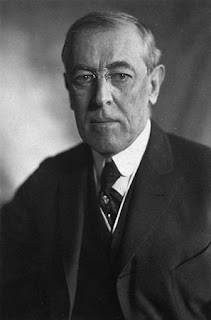Calvin Coolidge
July 4, 1872 (Plymouth Notch, Vermont) - Jan. 5, 1933 (Northampton, Mass.)
- This bears direct transcription: "COOLIDGE, CALVIN (1872-1933), was a shy, silent New England Republican who led the United States during the boisterous Jazz Age of the 1920's. He was the sixth Vice-President to become President upon the death of a chief executive. Coolidge was vacationing on his father's farm in Vermont when President Warren G. Harding died in 1923. The elder Coolidge, a notary public, administered the oath of office in the dining room. Never before had this ceremony been performed by such a minor official or by a President's father." Coolidge was sworn in a second time eighteen days later by a justice of the Supreme Court, since the Attorney General questioned the validity of the first oath of office. When Coolidge was later asked to recall his first thought upon learning that he would become President, he replied: "I thought I could swing it."
- Coolidge was known for his even temper. He was "solemn, frugal" in contrast to the boisterous masses... "a public that had largely thrown thrift to the wind," the nation's "flaming youth" as depicted by F. Scott Fitzgerald.
- As President, Coolidge tried to heal the administration after the corruption scandals of Harding's presidency. He pursued a policy called "constructive economy," supporting American business at home and abroad. He declared: "The business of American is business." In 1924, he easily won reelection, facing no real competition.
- In the White House, Coolidge's wife was gay and charming, happy to entertain. Coolidge stuck to behind-the-scenes details. "He enjoyed appearing unexpectedly in the kitchen to inspect the iceboxes and to comment on future menus. He once protested mildly because he thought 6 hams were too many for 60 dinner guests. Coolidge also liked to play practical jokes on the staff. He would ring for the elevator, then stride quickly down the stairs, or push all the buttons on his desk just to see all his aides run in at once."
- While in office, Coolidge's sixteen year old son died from "blood poisoning." He'd developed a blister on his toe while playing tennis, which resulted in an infection that spread! What a way to go! Awful, awful.
- Coolidge chose not to run again in 1928. He announced this decision by slipping a piece of paper to a reporter which read: "I do not choose to run for President in 1928." When asked to comment upon leaving the capital, he said: "Good-bye, I have had a very enjoyable time in Washington."
- The stock market crash of 1929 distressed Coolidge, who felt he may have done more to avert it while in office. He was increasingly unhappy in the early 30s. In 1933, Mrs. Coolidge found President Coolidge lying on the floor of his bedroom. He had died of a heart attack.


 Stop look so judgey, Woody... I'm trying to finish this project, I swear!
Stop look so judgey, Woody... I'm trying to finish this project, I swear!

